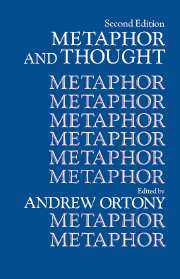Book contents
- Frontmatter
- Contents
- List of contributors
- Preface to the second edition
- Preface to the first edition
- 1 Metaphor, language, and thought
- METAPHOR AND MEANING
- 2 More about metaphor
- 3 Figurative speech and linguistics
- 4 The semantics of metaphor
- 5 Some problems with the notion of literal meanings
- 6 Metaphor
- 7 Language, concepts, and worlds: Three domains of metaphor
- 8 Observations on the pragmatics of metaphor
- METAPHOR AND REPRESENTATION
- METAPHOR AND UNDERSTANDING
- METAPHOR AND SCIENCE
- METAPHOR AND EDUCATION
- References
- Author index
- Subject index
6 - Metaphor
Published online by Cambridge University Press: 05 June 2012
- Frontmatter
- Contents
- List of contributors
- Preface to the second edition
- Preface to the first edition
- 1 Metaphor, language, and thought
- METAPHOR AND MEANING
- 2 More about metaphor
- 3 Figurative speech and linguistics
- 4 The semantics of metaphor
- 5 Some problems with the notion of literal meanings
- 6 Metaphor
- 7 Language, concepts, and worlds: Three domains of metaphor
- 8 Observations on the pragmatics of metaphor
- METAPHOR AND REPRESENTATION
- METAPHOR AND UNDERSTANDING
- METAPHOR AND SCIENCE
- METAPHOR AND EDUCATION
- References
- Author index
- Subject index
Summary
Formulating the problem
If you hear somebody say, “Sally is a block of ice,” or “Sam is a pig,” you are likely to assume that the speaker does not mean what he says literally but that he is speaking metaphorically. Furthermore, you are not likely to have very much trouble figuring out what he means. If he says, “Sally is a prime number between 17 and 23,” or “Bill is a barn door,” you might still assume he is speaking metaphorically, but it is much harder to figure out what he means. The existence of such utterances – utterances in which the speaker means metaphorically something different from what the sentence means literally – poses a series of questions for any theory of language and communication: What is metaphor, and how does it differ from both literal and other forms of figurative utterances? Why do we use expressions metaphorically instead of saying exactly and literally what we mean? How do metaphorical utterances work, that is, how is it possible for speakers to communicate to hearers when speaking metaphorically inasmuch as they do not say what they mean? And why do some metaphors work and others not?
In my discussion, I propose to tackle this latter set of questions – those centering around the problem of how metaphors work – both because of its intrinsic interest, and because it does not seem to me that we shall get an answer to the others until this fundamental question has been answered.
- Type
- Chapter
- Information
- Metaphor and Thought , pp. 83 - 111Publisher: Cambridge University PressPrint publication year: 1993
- 78
- Cited by



